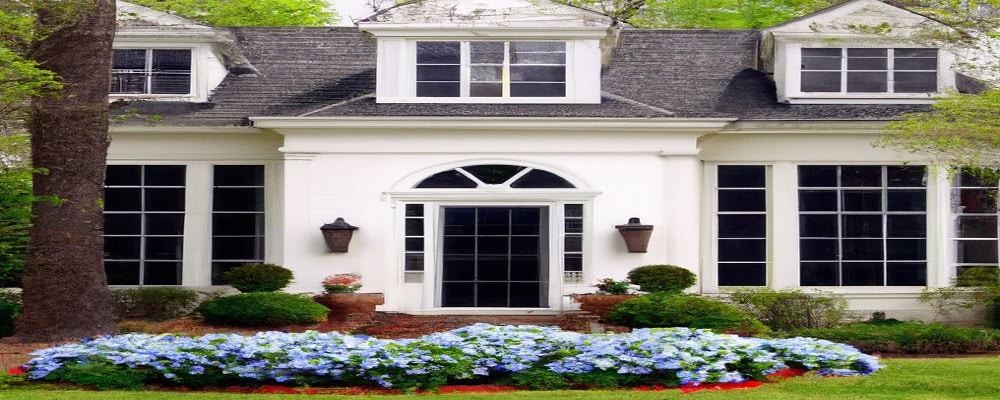An In-Depth Look at Acoustic Glass
Acoustic glass, a modern marvel, has revolutionized the way we build by offering unparalleled noise reduction. In this article, we explain the technology behind this innovative glass, its diverse applications, and its transformative impact on building quieter, more comfortable spaces.
Key Takeaways:
- Acoustic glass is a specialized type of glass designed for superior sound insulation and noise reduction.
- Its unique composition and technological advancements make it a preferred choice in modern building designs.
- Beyond soundproofing, acoustic glass offers thermal insulation, safety, and design versatility.
Acoustic Glass: What Is It?
Acoustic glass is a type of laminated glass characterized by its superior sound insulation properties. It consists of several layers, usually involving two panes of glass bonded with one or more layers of a sound-dampening material in between. This special construction is crucial for its remarkable ability to diminish sound transmission effectively, making it an excellent option for areas where minimizing noise is a key concern.

Benefits of Acoustic Glass
The use of acoustic glass offers numerous benefits, including:
- Reduced noise pollution: Creates a quieter and more peaceful environment.
- Improved sleep and concentration: Minimizes noise distractions for a better night’s rest and increased productivity.
- Enhanced well-being: Reduces stress and promotes a calm and relaxing atmosphere.
- Increased property value: Adds value to homes and businesses by improving the overall quality of life.
The Science Behind Acoustic Glass and its Noise Reduction Effectiveness
Acoustic glass, also known as soundproof glass, offers a significant advantage over regular glass: its ability to dampen and absorb sound waves. This remarkable property makes it a valuable tool in combating noise pollution and creating peaceful environments.
Understanding the Mechanics of Sound Insulation
Sound travels in waves, and its transmission is significantly affected by the material it encounters. Regular glass offers little resistance to sound waves, allowing them to pass through with minimal disruption. This results in noise disturbances indoors, impacting our comfort and well-being.
Acoustic glass, however, incorporates a special layer known as an interlayer, typically made of materials like Polyvinyl Butyral (PVB). This interlayer acts like a barrier, significantly hindering the passage of sound waves.
How Interlayers Dampen and Absorb Sound

The interlayer plays a crucial role in the effectiveness of acoustic glass. When sound waves encounter the interlayer:
- Dampening: The interlayer’s viscoelastic properties cause it to vibrate in response to the sound waves. This vibration converts part of the sound energy into heat, effectively reducing the intensity of the sound waves passing through.
- Absorption: The interlayer also possesses sound absorption properties. This means it traps and dissipates some of the sound energy, further reducing the amount that can pass through the glass.
The Impact of Thickness and Material on Noise Reduction
The noise reduction capabilities of acoustic glass are significantly influenced by two key factors: the thickness of the glass and the sound-absorbing material used within the laminate layer.
1. Glass Thickness:
Thicker glass provides a greater barrier for sound waves to overcome, leading to better noise reduction. This is because thicker glass panels have more mass, which helps to absorb sound energy and reduce its transmission.
| Glass Thickness | Noise Reduction |
|---|---|
| 6mm thickness | Offers moderate noise reduction, typically blocking around 30-35 dB of noise. |
| 10mm thickness | Provides significant noise reduction, blocking up to 40 dB of noise. |
| 12mm thickness | Offers the highest level of noise reduction, blocking up to 45 dB or more of noise. |
2. Sound-Absorbing Material:
The type of sound-absorbing material used within the laminate layer plays a crucial role in determining the overall noise reduction efficiency.
Here are some common sound-absorbing materials used in acoustic glass and their respective effectiveness:
- Polyvinyl Butyral (PVB): This is the most common and affordable option, offering good noise reduction for moderate noise levels. It can typically block around 30-35 dB of noise.
- Laminated glass with PVB interlayer: This combination offers enhanced noise reduction compared to standard PVB alone. It can block up to 40 dB or more of noise, making it suitable for noisy environments.
- Acoustic films: These films can be applied to existing windows to improve their noise reduction capabilities. They offer varying degrees of effectiveness depending on the thickness and material of the film.
Data and Examples:
- Viridian Hush Glass: A leading brand in the acoustic glass market, Viridian Hush Glass offers various thickness options to cater to different noise reduction needs. A 6mm variant of this product can block up to 36 dB of noise, marking a significant improvement over conventional glass.
| Feature | Acoustic Glass | Toughened Glass | Annealed Glass | Double Glazing |
|---|---|---|---|---|
| Noise Reduction (dB) | Up to 45 dB | Up to 30 dB | Up to 28 dB | Up to 32 dB |
| Mechanism | Laminated glass with sound-absorbing interlayer | Tempered glass with increased strength | Standard glass | Two panes of glass separated by an air gap |
| Cost | High | High | Low | Moderate |
| Energy Efficiency | Moderate | High | High | Moderate |
| Security | High | High | Low | Moderate (can be laminated for increased security) |
| Durability | High | High | Moderate | Moderate |
| Maintenance | Low | Low | Low | Moderate (requires cleaning of air gap) |
| Applications | Homes, offices, recording studios, hospitals, schools | Building windows, doors, shower enclosures | Building windows, doors, shelves | Homes, offices, studios, noisy environments |
| Best for | High noise reduction, improved privacy | Security, strength | Budget-friendly windows, doors | Moderate noise reduction, energy efficiency |
Notes:
- Decibel reduction is a measure of how much quieter a material makes a sound. The higher the decibel reduction, the better the noise insulation.
- Acoustic glass can be combined with other soundproofing materials for even greater noise reduction.
- The cost of acoustic glass varies depending on the thickness of the glass, type of interlayer, and desired decibel reduction.
- Double glazing can be combined with acoustic glass for the best noise reduction and energy efficiency.
Acoustic Glass Costs
| Type of Glass | Price | Features |
|---|---|---|
| Vlam Hush Glass | Approximately $440 per square meter | High sound reduction, various thickness options |
| Standard Acoustic Glass | $300 - $600 per square meter | Effective noise reduction, customizable |
| Regular Laminated Glass | $100 - $250 per square meter | Standard glass features |
Applications of Acoustic Glass

Residential Applications:
| Area | Benefits | Improvements/Advantages |
|---|---|---|
| Homes in Noisy Urban Areas | Reduces noise pollution from traffic, construction | Enhances sleep quality, reduces stress, increases well-being |
| Homes Near Airports or Highways | Significant reduction in noise from aircraft and traffic | Essential for families with young children or home workers |
| Home Studios and Music Rooms | Soundproofing for music practice or recording | Prevents noise leakage, ensures focused environment |
| Home Theaters and Media Rooms | Improves audio experience by minimizing external noise | More immersive for movies, gaming, etc |
| Partitions Within Home | Creating partitions like dividing walls for bedrooms, offices | Improves privacy and reduces noise transmission |

Commercial Applications:
| Area | Benefits | Impact/Advantage |
|---|---|---|
| Offices | Creates quiet work environments, reduces noise pollution | Improves concentration, productivity, and reduces stress |
| Conference Rooms | Ensures privacy and confidentiality | Prevents sound leakage, minimizes distractions |
| Hospitals and Healthcare Facilities | Creates calm environment, reduces noise in patient areas | Promotes better sleep, faster recovery, positive experience |
| Educational Institutions | Minimizes noise in classrooms, libraries, study rooms | Enhances focus, learning effectiveness |
| Restaurants and Cafes | Creates intimate dining experience, reduces noise | More relaxing for guests, improves ambiance |
| Recording Studios and Music Venues | Essential for soundproof recording and live performances | Prevents noise leakage, ensures clear recordings |
Additional Applications:
| Area | Use | Benefit |
|---|---|---|
| Transportation | Used in airplanes, trains | Reduces noise for passengers |
| Retail Spaces | Creates calming atmosphere | Reduces noise for better shopping experience |
| Public Buildings | Used in libraries, museums | Quiet, peaceful visitor spaces |
Important Considerations for Acoustic Glass

Installation:
- Requires specialized expertise and precision.
- Incorrect installation significantly impacts soundproofing effectiveness.
- Factors like air gap size, seal quality, and frame integrity are crucial.
Cost:
- Typically more expensive than standard glass.
- Initial investment vs. long-term benefits (energy savings, comfort, property value).
Maintenance & Durability:
- Similar to standard glass, but consider interlayer sensitivity:
- Sunlight: prolonged exposure can degrade performance.
- Extreme temperatures: can affect durability.
- Understanding maintenance needs and lifespan is crucial.
Challenges and Considerations
Installation Challenges The installation of acoustic glass requires precision and expertise. Incorrect installation can significantly diminish its effectiveness in sound insulation. Factors such as the size of the air gap between panes, the quality of seals, and the overall integrity of the window frame play a crucial role in the performance of acoustic glass.
Cost Comparison and Cost-Effectiveness While acoustic glass offers numerous benefits, it is typically more expensive than standard glass. This cost factor is a vital consideration for builders and homeowners. However, it’s important to weigh the initial investment against the long-term benefits, such as energy savings, improved comfort, and potential property value enhancement.
Maintenance and Durability Maintaining acoustic glass is similar to standard glass, but it’s essential to consider its durability. The interlayer materials can be sensitive to prolonged exposure to sunlight and extreme temperatures. Hence, understanding the maintenance requirements and life expectancy of acoustic glass is important for making an informed decision.
FAQ
The effectiveness of acoustic glass compared to double glazing depends on individual needs. Acoustic glass generally surpasses double glazing in terms of noise reduction. However, double glazing usually scores higher on energy efficiency, which may result in lower energy bills.
Hush Glass is a proprietary acoustic glass variant produced by Viridian. Due to its superior quality and noise reduction attributes, it’s one of the most sought-after acoustic glass brands in the market.
Absolutely! Acoustic glass is an excellent option for residential properties located in noisy areas. It significantly reduces noise pollution, leading to a quieter and more comfortable living environment.
The sound reduction level of acoustic glass is measured in decibels (dB). The higher the dB rating, the more noise is reduced.
No, there is no noticeable difference in appearance. Acoustic glass looks just like regular glass. The difference lies in the internal structure, with the sound-absorbing layer hidden between the two layers of glass.
While acoustic glass is primarily designed for noise reduction, it can also offer some level of thermal insulation, particularly if it is double-glazed. However, for optimal thermal insulation, specially designed thermal glass or double glazing is recommended.
What Our Clients Say About Acoustic Glass
To help you understand the tangible benefits of Acoustic Glass, we’ve gathered several testimonials and case studies from our clients who have experienced a substantial improvement in noise reduction after installation:

Case Study: Residential Home in Surry Hills NSW
Lucy Davis, a homeowner in Sydney, opted to install acoustic glass in her home. She commented, “The improvement was instantly evident. Our home has become so much quieter, shielding us from the hustle and bustle of city life. The noise reduction was so significant that it felt like moving to a quiet suburb. I’d wholeheartedly recommend Acoustic Glass to anyone looking to escape from noise pollution.”
Case Study: Optus Centre, 1 Lyonpark rd, Macquarie Park NSW
Stewart Burns was responsible for the implementation of acoustic glass in an office building. He noted, “We’ve observed a remarkable enhancement in our employees’ working conditions. The acoustic glass drastically reduced external noise, facilitating a more focused and productive work environment. I can confidently say that it was a beneficial step towards improving our workspace.”
Case Study: Culture Kings, Parramatta NSW
Patricia Gomez, a retail store manager, recounted her experience: “After installing acoustic glass, we noticed that our customers could shop in a more peaceful and comfortable environment, away from the street noise. Our staff also reported less stress and better communication. It was certainly a worthwhile investment.”
Final Thoughts
Evaluating acoustic glass from an expert’s perspective, I can affirm its effectiveness in sound insulation. Its advanced design and noise reduction capability make it a preferred choice in environments where noise reduction is paramount. However, its cost and individual requirements should also be factored in when considering its implementation.

Khalil is the owner of Splendid Window Glass Repairs and has over 8 years experience as a glazier specialising in window glass repair, replacement and installations. Khalil takes great pride in his work and prides himself on providing an excellent service to all of his customers, no matter how big or small the job may be.
Copyright © 2024 Splendid Window Glass Repairs
SEO & Website by Wong Way SEO
